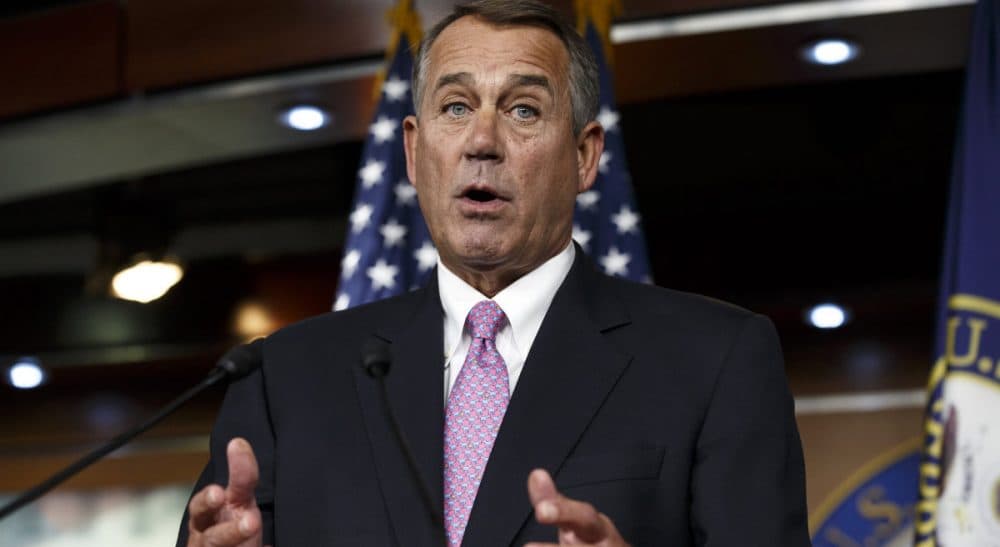Advertisement
Debt Ceiling: The GOP's Accidental Strategy

Now that the dust has settled on last week’s vote in Congress to increase the nation’s debt ceiling yet again, it’s apparent that Republicans got away with one through no fault of their own.
Despite lacking a unified strategy in either chamber literally up to the moment they cast their votes, the GOP somehow stumbled into the right solution as it looks to hold the majority in the House and regain it in the Senate during next fall’s mid-terms.
Congressional Republicans narrowly avoided giving President Obama an opening to shift their current mid-term issue focus away from the ongoing, tragic ineptitude of the Affordable Care Act rollout to having to defend their own misguided brinkmanship. They now don’t have to suffer through a barrage of condemnation from across the political spectrum.
Most Republicans can take their ‘no’ votes back to their districts and continue to blame Democrats for the debt and for an economy that has not provided a recovery for the nation’s middle class.
Congress voted against walking the nation to the edge of default and destabilizing a still-fragile world economy. And the kicker for the GOP is that this was achieved with a minimal number of Republican votes. Moreover, only a handful of Republicans who helped pass the “clean” debt ceiling legislation are involved in tough re-election campaigns.
Thus, the GOP still has the national debt — which, according to the Congressional Budget Office, is currently 73 percent of our GDP (after standing at about 40 percent of GDP when Obama took office) — as a formidable mid-term issue. Most Republicans can take their ‘no’ votes back to their districts and continue to blame Democrats for the debt and for an economy that has not provided a recovery for the nation’s middle class. Importantly to these GOP members of Congress, both of those issues play well not only with the base back in the districts, but also with independents. They will also be able to keep the drum beating on the political gift that keeps on giving — the ACA.
In the wake of the GOP near-miss, there’s been some hand-wringing among Republican pundits about the role of the Tea Party in making it an uncomfortable couple of days for the establishment. On the other side of the ideological aisle, some GOP critics have offered the “what if” approach to keep the issue alive a bit longer. This strategy tries to make the electorate contemplate the damage done to the nation’s — and the world’s — economy if the U.S. had actually been driven to default by congressional Republicans.
That scenario, however, didn’t occur. So, the only voters this slightly desperate prosaic ploy appeals to are those who wouldn’t vote Republican anyway. And that’s about as far as the negative impact of this issue will go toward affecting Republicans in November — to the consternation of some who had hoped the electoral tea leaves were about to start changing for the mid-terms.
As for the in-fighting, Sen. Ted Cruz's filibuster contravened the spirit of the GOP’s “11th commandment” against speaking badly about another member of the party in public that one of his supposed role models, President Reagan, etched in stone. Cruz’s tactic, though, went beyond the mere business of politics. It seemed personal and aimed at trying to harm Sens. Mitch McConnell and John Cornyn, both of whom actually do face competitive elections this fall. Both McConnell and Cornyn took one for the team. They also took their leadership roles seriously and covered their members against political blowback now — and in November.
McConnell and Cornyn, like Rep. John Boehner in the House, kept their eye on the mid-term ball. As a result, the GOP somehow still remains a clear favorite to hold the House and is a virtual toss-up to capture the Senate.
Thus, with the passing of the debt-ceiling drama, there is still no apparent counter-policy issue to rival the ACA. Not that the Democrats won’t continue to try to create one — especially in Congress.
The next issue percolating on Capitol Hill that the Democrats see as an opportunity and the Republicans view as fraught with peril is immigration reform. The president wasted little time after Congress passed the debt-ceiling hike, stating during an interview with Univision that he’d like to get it done “this year.”
with the passing of the debt-ceiling drama, there is still no apparent counter-policy issue to rival the ACA.
Also, some members of the GOP business class, typified by the Wall Street Journal board of editors and echoed by columnists like George Will, are pushing for a solution sooner rather than later. But the immigration issue has not yet resonated with the GOP majority in the House, who want to play their hand out to see if their party will have a new and improved playing field after the mid-terms to deal with emotional issues among its base like amnesty and border control. The issue also does not appear to be a priority among the GOP base — nor among independents — who are far more focused on the economy and the foibles of government overreach embodied by the ACA.
The eight and a half months leading to the mid-terms will provide ample opportunity for political mischief and posturing, and perhaps even the emergence of a new policy focus to rival the ACA. This is particularly true for congressional Republicans who are in the midst of change within a party that currently lacks a national leader around whom they can coalesce.
Nevertheless, the GOP’s accidental strategy put a potential major pitfall in its rearview last week, and some Democratic members of Congress facing tough re-elections in the fall must be ruing a missed opportunity.
Related:
